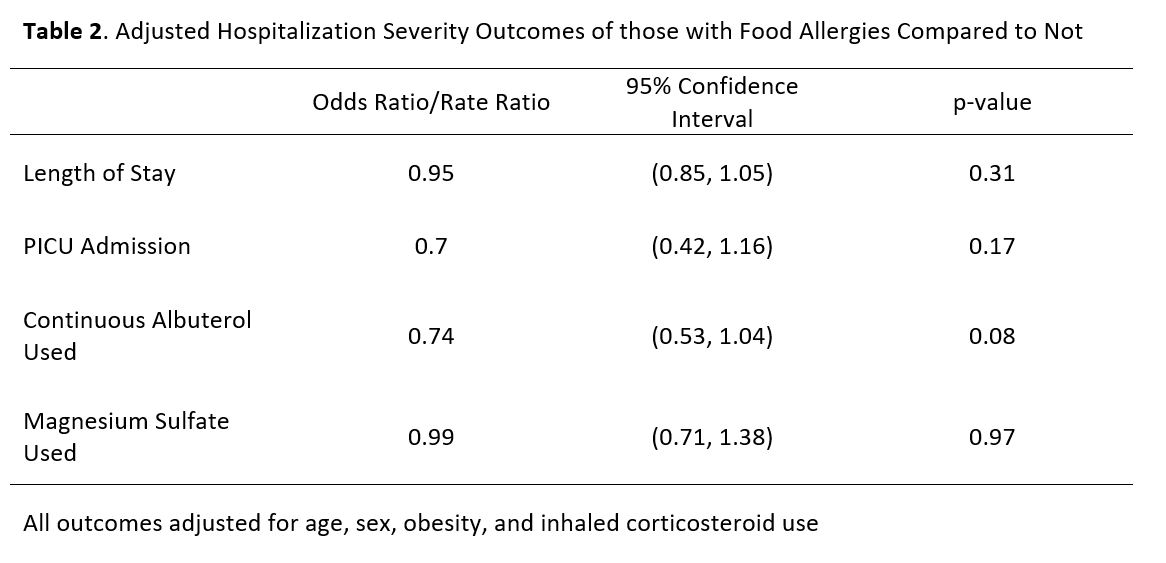Back
Asthma
Category: Abstract Submission
Asthma
33 - Association of Food Allergy Status to Severity of Acute Asthma Exacerbation in Hospitalized Children
Sunday, April 24, 2022
3:30 PM – 6:00 PM US MT
Poster Number: 33
Publication Number: 33.300
Publication Number: 33.300
Raymond Parlar-Chun, McGovern Medical School at the University of Texas Health Science Center at Houston, Houston, TX, United States

Raymond Parlar-Chun, MD
Associate Professor of Pediatrics
McGovern Medical School at the University of Texas Health Science Center at Houston
Houston, Texas, United States
Presenting Author(s)
Background: Prior studies have shown that patients with asthma and food allergies have an increased frequency of exacerbations requiring emergency room visits and hospitalizations. It is unclear whether these patients have increased severity of exacerbations compared to patients without food allergies who are also hospitalized.
Objective: We aim to evaluate the association of patient food allergy status with various severity measures such as hospital length of stay, need for PICU admission, use of continuous albuterol, and use of magnesium sulfate.
Design/Methods: Patients aged 4-17 years old admitted with an asthma exacerbation between 1/2012 – 12/2016 were identified using ICD 9/10 codes. Presence of food allergy, age, sex, obesity (>95%ile BMI), and whether they had been prescribed home inhaled corticosteroids (ICS) were obtained from the EMR. Length of stay was calculated in hours and treated as a count and analyzed with negative binomial regression model. PICU admission, use of continuous albuterol, and use of magnesium sulfate were treated as binary outcomes and analyzed with multiple logistic regression models.
Results: 1269 patients were identified of which 172 (14%) had documented food allergies. Patients with food allergies were more likely to have been prescribed an ICS (52% vs. 35%, p < 0.0001) and decreased prevalence of obesity (12% vs. 18%, p =0.049). There were no significant differences in unadjusted comparisons in length of stay, PICU admission, continuous albuterol use, or magnesium sulfate use. After adjustment for age, sex, ICS use, and obesity, there continued to be no difference in length of stay (IRR 0.95, 0.85 – 1.05 95% CI, p=0.31), PICU admission (aOR 0.7, 0.42 – 1.16 95%CI, p=0.17), continuous albuterol use (aOR 0.74, 0.53 – 1.04 95% CI, p=0.08), or magnesium sulfate use (aOR 0.99, 0.71 – 1.38 95%CI, p=0.97).Conclusion(s): While patients with food allergies may have increased exacerbations requiring emergency room visits or hospitalizations, the severity of exacerbation does not seem to be associated with food allergy status. Clinicians may take into account food allergy status to determine need for controller therapy, however a patient's food allergy status does not seem to indicate a need for changes in the acute management of an exacerbation.
Baseline Characteristics by Food Allergy Status and Unadjusted Outcomes.jpg)
Adjusted Hospitalization Severity Outcomes of those with Food Allergies Compared to Not
Objective: We aim to evaluate the association of patient food allergy status with various severity measures such as hospital length of stay, need for PICU admission, use of continuous albuterol, and use of magnesium sulfate.
Design/Methods: Patients aged 4-17 years old admitted with an asthma exacerbation between 1/2012 – 12/2016 were identified using ICD 9/10 codes. Presence of food allergy, age, sex, obesity (>95%ile BMI), and whether they had been prescribed home inhaled corticosteroids (ICS) were obtained from the EMR. Length of stay was calculated in hours and treated as a count and analyzed with negative binomial regression model. PICU admission, use of continuous albuterol, and use of magnesium sulfate were treated as binary outcomes and analyzed with multiple logistic regression models.
Results: 1269 patients were identified of which 172 (14%) had documented food allergies. Patients with food allergies were more likely to have been prescribed an ICS (52% vs. 35%, p < 0.0001) and decreased prevalence of obesity (12% vs. 18%, p =0.049). There were no significant differences in unadjusted comparisons in length of stay, PICU admission, continuous albuterol use, or magnesium sulfate use. After adjustment for age, sex, ICS use, and obesity, there continued to be no difference in length of stay (IRR 0.95, 0.85 – 1.05 95% CI, p=0.31), PICU admission (aOR 0.7, 0.42 – 1.16 95%CI, p=0.17), continuous albuterol use (aOR 0.74, 0.53 – 1.04 95% CI, p=0.08), or magnesium sulfate use (aOR 0.99, 0.71 – 1.38 95%CI, p=0.97).Conclusion(s): While patients with food allergies may have increased exacerbations requiring emergency room visits or hospitalizations, the severity of exacerbation does not seem to be associated with food allergy status. Clinicians may take into account food allergy status to determine need for controller therapy, however a patient's food allergy status does not seem to indicate a need for changes in the acute management of an exacerbation.
Baseline Characteristics by Food Allergy Status and Unadjusted Outcomes
.jpg)
Adjusted Hospitalization Severity Outcomes of those with Food Allergies Compared to Not

